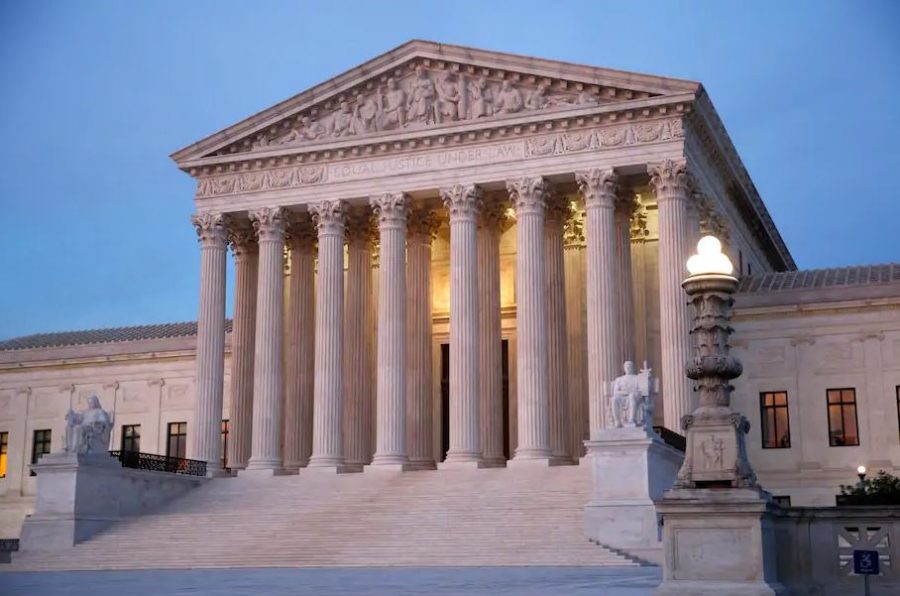Supreme Court Considers Redress for Violated Rights
Photo courtesy Patrick Semansky/AP
On January 12th, the Supreme Court heard oral arguments for Uzuegbunam v Preczewski, which considers whether nominal damages can be disputed if unconstitutional policies are revised during litigation.
In 2016, officials stopped Chike Uzuegbunam, a student at Georgia Gwinnett College, from distributing religious literature and sharing his faith on campus. Citing school policies, officials told Uzuegbunam he had to reserve a spot in one of two free speech zones to speak publicly about his beliefs. Uzuegbunam obtained a reservation, but officials stopped him once again, claiming he caused “disorderly conduct.” The officials’ actions prompted Joseph Bradford, a friend of Uzuegbunam, to abandon plans to speak at the event.
Uzuegbunam and Bradford sued the college for violating their 1st and 14th Amendment rights. They sued for a declaration that the speech code was unconstitutional along with nominal damages, typically $1 or $2 awarded when the plaintiff is in the right but has not suffered a measurable loss. In response, college administrators including President Stanley Preczewski voided the challenged policies and then filed to dismiss the case. The students countered by arguing their case could still continue on nominal damages claims alone.
During oral arguments, the students’ lawyer, Kristen Waggoner, argued that while the college revised its policies, it needs to be held accountable for violating the students’ rights. The only remedy is nominal damages, which are designed to redress “injuries that transcend price tags.” These include injuries that are difficult to measure, like a violation of speech. This is opposed to compensatory damages, which cover quantifiable loss like car damages from an accident. Waggoner pointed to centuries of court rulings where judges awarded nominal damages in cases similar to Uzuegbunam and Bradford’s. Deputy Assistant Attorney General Hashim Mooppan also argued on the students’ behalf.
Andrew Pinson, the lawyer for the college, held that without the threat of future injury, only cases that seek compensation should continue through courts. He argued nominal damages aren’t compensation because they are of so little value. He contended allowing plaintiffs to sue solely on nominal damages claims encourages unnecessary litigation. Nominal damages could be a vehicle for advisory opinions––non-binding opinions on the law––which may give people vindication but aren’t legal rulings.
Chief Justice John Roberts questioned whether cases that only seek nominal damages have legal standing (the right to sue). To have standing, plaintiffs must demonstrate they suffered a concrete injury traceable to the defendant that is likely to be resolved by the court. However, Roberts pointed out, Georgia Gwinnett college already removed the portions of its speech code that the plaintiffs challenged. What more were the plaintiffs seeking than a declaration that they were right, symbolized by nominal damages?
Waggoner replied that under Article III of the Constitution injuries require redress, no matter how insignificant the amount of money awarded. The plaintiffs sought nominal damages to redress past injury, which declaratory judgment couldn’t accomplish.
Meanwhile, Justice Kagan questioned whether past nominal damages cases were relevant. For instance, some decisions came before certain legal judgments existed. In others, courts dealt with damages that weren’t quantified but now have fixed monetary values. In what ways are nominal damages claims necessary today? Citing 19th century Justice Joseph Story, Moopan said all injuries cause damage and require compensation. While some cases are monetized, for those in which damage isn’t or can’t be measured, nominal damages remain the appropriate recourse.
Justice Kagan also had a question for Pinson concerning “the most famous nominal damages case I know of in recent time.” In this case, American singer and songwriter Taylor Swift sued a radio host for sexual assault. Swift sued for $1, not as compensation for her injury, but as an acknowledgment of harm. Why couldn’t she do that? Pinson argued that Swift should have alleged a compensable injury and received compensatory damages instead of nominal damages.
Justice Kavanaugh brought up Pinson’s claim that allowing cases that relied solely on nominal damages to go forward would lead to unnecessary and prolonged litigation. However, couldn’t a defendant avoid this problem simply by paying a dollar? Kavanaugh also noted that plaintiffs who only sue for nominal damages generally don’t receive much money to pay for attorney’s fees. Wouldn’t this also disincentive wasteful litigation?
To summarize, the plaintiffs argue cases should be able to continue on nominal damages even after unconstitutional policies are revised. Past injuries need to be redressed, even if there is no threat of future harm. The respondents contend Uzuegbunam and Bradford’s lawsuit prompted officials to change their policies, and the issue should have been resolved there. Allowing cases to continue based solely on nominal damages claims would lead to drawn-out litigation.
A ruling in the students’ favor could affect the enforcement of not just school but also government policies. The Supreme Court will release its decision sometime this year.

Grade: 12
Years on Staff: 4
Why are you writing for the Flintridge Press?
To address issues relevant to our time, to express ideas through writing,...










